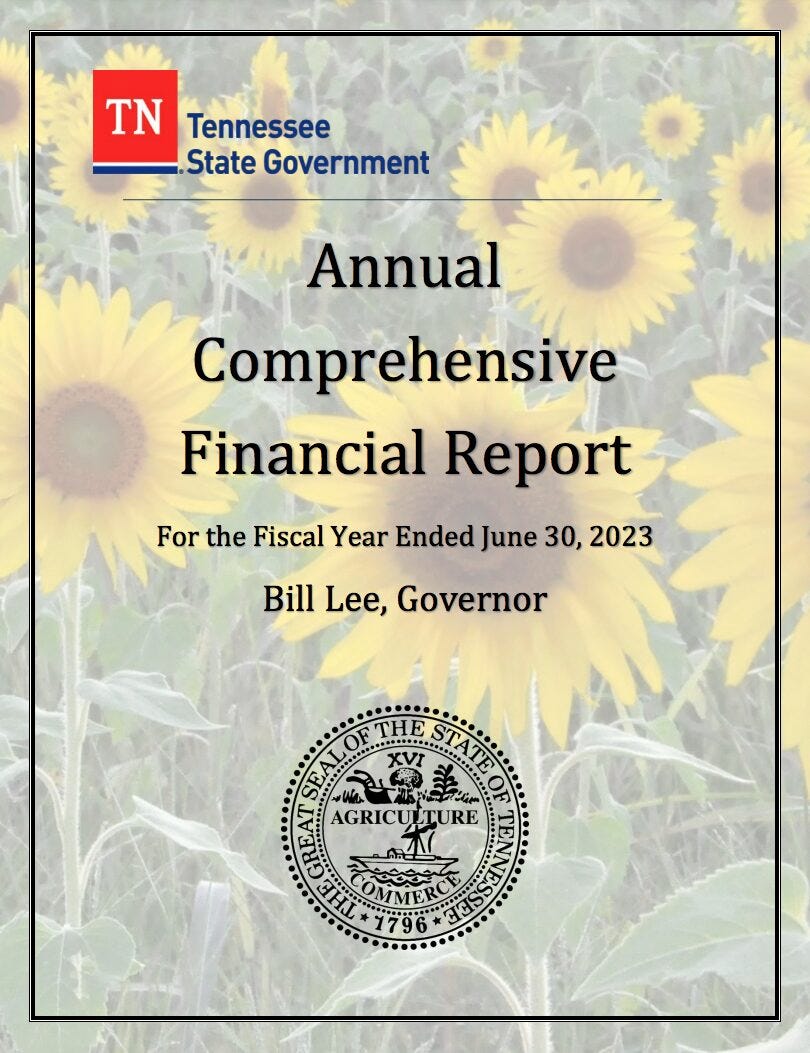Will U.S. inspector general OK continued $1 billion funding if TN engages in fraud?
‘Mandatory insurance’ shakedown under Gov. Lee, revenue boss Gerregano may set off financial integrity alarms in Washington, D.C.


State government got F$1.154 billion in federal money for highways in the fiscal 2022-2023 year, according to its CAFR, the state’s comprehensive annual financial report, p. 44.
That’s $1,154,481,000.
No doubt with a spirit of getting its due, Tennessee state corporate government receives F$15.456 billion from Uncle Sam that year, or F$15,456,756,000 if you are counting down to the last thousand bucks.
The money helped in resurfacing 2,374 miles of road and ran Tennessee’s transportation bureaucracy.

These figures are breathtaking, and we wonder if Uncle Sam will draw a sudden — if wheezing — gasp if he were to learn about the fraud and racketeering operation run out of the state’s department of revenue.
Tennessee is operating a shakedown against the public, in violation of clear Tennessee law, and very possibly in violation of its agreements with its masters in Washington, D.C. who at least want things to look honest. Accountability to the public, y’know.
The USDOT, or the federal department of transportation, audits how federal dollars are spent, and how the department can chop back fraud and crime and increase efficiency of federal spending.
“The Department of Transportation office of inspector general conducts a wide array of investigations to detect and prevent fraud, waste, abuse, and criminal violations of laws affecting the department,” Eric Soskin the inspector inspector says in an August 2023 letter to four congressmen, “including FMCSA and DOT’s eight other operating administrations. OIG is the principal law enforcement office within DOT and is made up of approximately 100 law enforcement officers nationwide with authority to carry firearms, execute warrants, and make arrests.
“Our primary investigative priorities are crimes that affect public safety and fraud schemes that significantly impact the large volumes of funding distributed by the Department. We continuously collaborate with OAs; other key DOT stakeholders; and numerous federal, state and local law enforcement entities to bring wrongdoers to justice.”
Elise Chawaga handles USDOT fraud investigations among grantees. Susan Ocampo supervises the day-to-day investigative activities of DOT staff.
Hmmm. I wonder what Tennessee revenue commissioner might have to say in considering these august words.
The OIG staff includes over 250 auditors, analysts, information technology experts, economists, statisticians, editors, and other specialists at DOT’s Washington, D.C., headquarters and at eight field offices throughout the country.
“We disseminate our findings and recommendations to DOT, Congress, and the public through reports, testimonies, and advisories.”
The IG”s office in a March 31 report to congress mentions its “Do Not Pay Initiative” that targets “internal control weaknesses” that contributed to DOT’s noncompliance with the Do Not Pay Initiative.
TDOT indicates open ear
Racketeering and fraud in Tennessee government may raise alarms elsewhere. Jonathan Skrmetti, attorney general, is not concerned. Jason Mumpower, comptroller of treasury, is not concerned.
The state department of transportation is watchful for fraud, and indicates on its website it is willing to hear about it.
The department has an office of Internal Audit offering Integrity Services. TDOT is willing to hear of harm, fraud, waste and abuse, including “corruption or official misconduct.” The fraud in view is that within the department. The fraud exposed in our case, Tulis v. DOR, targets is that within the department of revenue, a separate agency.
Perhaps I can ask Jennifer Herstek, the head of the department’s finance division, how things would be for her department if suddenly she were informed that Uncle is not willing to accept another month of shenanigans and racketeering in the Volunteer State’s because of the revenue shakedown affecting the motoring public.







